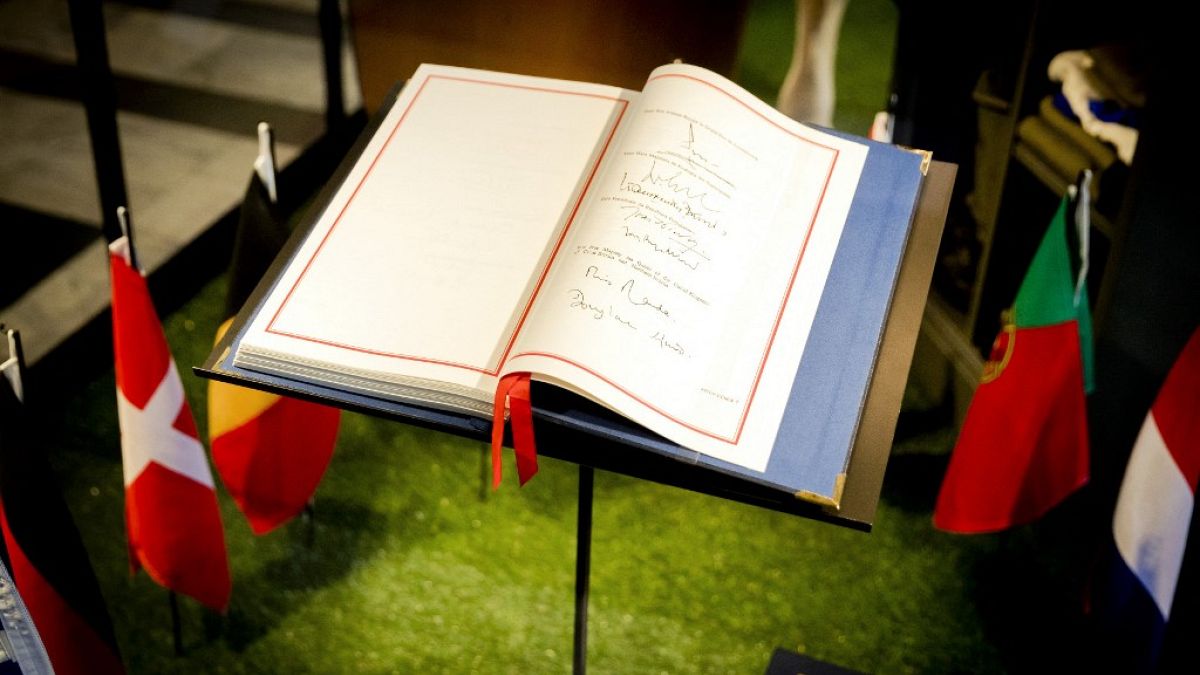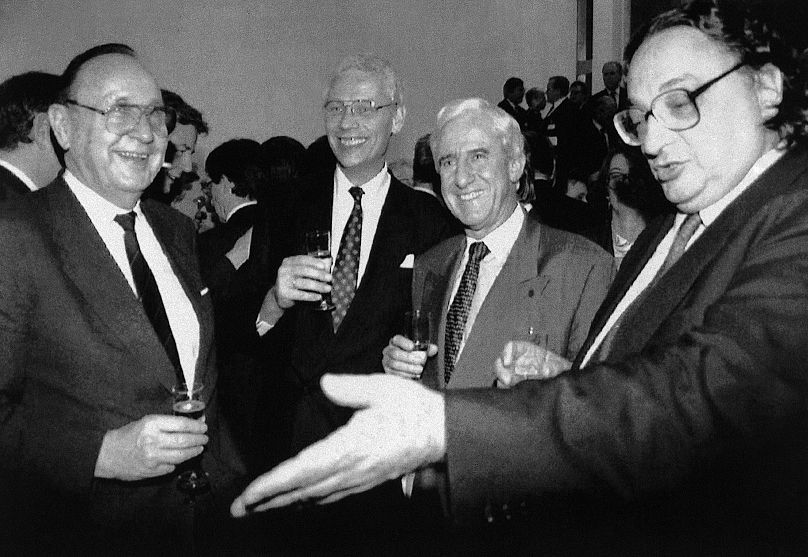The treaty that established the European Union also laid the ground for strict fiscal rules that are today the target of intense criticism.
Thirty years ago on this very day, representatives of the twelve member states of what was then European Communities gathered in the Dutch city of Maastricht to give a new impetus to their decades-long but still incomplete project of economic and political integration.
"This Treaty marks a new stage in the process of creating an ever closer union among the peoples of Europe, in which decisions are taken as closely as possible to the citizen," read the first article.
The Maastricht Treaty came at a most auspicious time for Europe: the Berlin Wall had fallen, the Soviet Union had collapsed and liberal democracy had reached its peak of popularity.
The auspicious circumstances called for a redesign of the European Communities, which were up to that point mostly focused on building a tariff-free, seamless market that would forever tie the destiny of its member states and prevent future armed conflicts.
Belgium, Denmark, France, Germany, Greece, Ireland, Italy, Luxembourg, the Netherlands, Portugal, Spain and the United Kingdom felt it was time to aim higher.
Seizing the moment, the twelve countries decided to create the European Union, a term that is widely used today but that back then lacked any legal power.
Three pillars of the European Union
The formal step brought an immediate change for ordinary Europeans: the introduction of EU citizenship, automatically granted to all citizens of the union.
It allowed EU citizens to "move and reside freely" across the bloc and stand in municipal and European elections in their country of residence.
The legal status quickly became one of the EU's most palpable achievements: 72% of the bloc's population say they feel like EU citizens, according to a 2021 Eurobarometer.
The rebranded EU was structured in three pillars to reflect its ambitious scope.
The first one absorbed the existing European Communities into a single European Community (EC) and dealt with varied matters such as the customs union, agricultural policy, fisheries, competition law and the environment, areas where Brussels enjoyed a higher degree of competence and autonomy.
The second pillar was devoted to the common foreign and security policy — an innovative addition to the EU decision-making.
However, given the political sensitivity of the issues at hand, decisions were zealously led by member states, with little to no input from the European Commission and the European Parliament, and taken on the basis of unanimity, a practice that continues to this day.
The third pillar centred on police and judicial cooperation for questions like terrorism, human trafficking and organised crime.
Clamping down on this kind of cross-border crime became imperative after the 1985 signing of the Schengen Agreement, which progressively abolished border checks.
"30 years ago the Maastricht treaty was signed… but never delivered its full potential, neither in common foreign and security policy nor in justice and home affairs," Belgian MEP Guy Verhofstadt, a renowned federalist, wrote on Twitter marking the treaty's anniversary. "Unanimity and vetoes often blocked any progress."
The three-tier system cemented the role of the European Parliament as one of the two co-legislators, together with the Council, where national ministers cast their votes.
The structure was relatively short-lived: it disappeared in 2009, when the Lisbon Treaty entered into force and replaced the separate pillars with a simplified list of exclusive, shared and supporting competencies.
'A jumble of rules'
Despite the UK's often combative attitude within the 12-strong club, the limited amount of member states made it easier to reach consensus and pave a collective set of objectives. Chief among them was the establishment of a single currency – the euro – which many saw as the most natural step after the single market.
The debate around the euro had been ranging for several decades and leaders eventually settled on a three-stage transition process that would begin with the free movement of capital between member states and be followed by a gradual alignment of economic policies.
The Maastricht Treaty laid the ground for the European Central Bank (ECB), with a mandate to maintain price stability.
While Denmark and the UK were quick to ratify exceptions to pull out of the single currency, the remaining 10 member states agreed to comply with five main criteria to help converge their vastly disparate economies.
The "Maastricht Criteria" set rules for inflation, interest rates, exchange rates and public debt, and still apply to any country that wants to join the euro.
"There were many differences amongst the different countries. First of all, because of the starting points: it is so different to imagine the track that countries like Germany or countries like Greece or Italy [were in]," former Italian Prime Minister Enrico Letta told Euronews in a video interview.
"In the first ten years, it was so clear that we had some up and down related to the different countries. Today, I think there's an average success and it is another reason to show [the euro] as a success."
The limits that compelled countries to keep their public deficits under 3% and government debt under 60% of GDP were later turned into binding EU-wide fiscal rules for all member states, in and outside the eurozone, under the name of the Stability and Growth Pact (SGP).
Today, the SGP is one of Maastricht's most enduring and contested legacies.
The pact, in place since the late 1990s and reinforced during the financial crisis, has been widely criticised for its complexity and stringency but also for its irregular compliance and biased enforcement.
Southern countries have often complained of being unfairly targeted while bigger economies, like France and Germany, have seen their budgetary excesses go unpunished.
"The Stability and Growth Pact is a jumble of rules, which is unintelligible to 99% percent of humanity. None of us is able to explain it to the politicians who have the political responsibility for applying it," says Thomas Wieser, former president of the Eurogroup Working Group, an advisory body to the finance ministers of the eurozone.
"But it is a very stable bed equilibrium because the more Calvinistic-inclined politicians don't want to open up the rules because they're afraid that they would get too lax. And the more, let's say, Catholic-minded politicians are afraid [the rules] would get too Calvinist."
Unfinished work
The coronavirus pandemic, which sent public debt ballooning, has opened the door for reform that many consider long overdue.
Italy, France and Spain are leading the charge to amend Maastricht's legacy and install flexible rules that take into account the devastating effects of the virus and the huge investments needed to fight climate change.
But on the other side of the table, the so-called Frugal Four – Austria, the Netherlands, Denmark and Sweden – together with Finland, Latvia, Slovakia and the Czech Republic are pushing back, demanding that healthy budgetary policies stay the norm, not the exception.
"It is important to have a complete deep reform. We need some changes, more on sustainability rather than stability. A more tailor-made approach, country by country," says Letta, whose homeland, Italy, has debt levels (156%) that dwarf the SGP's 60% limit.
"The [COVID-19] crisis attacked different countries in a differentiated mode. And so it is impossible to have exactly the same approach to differentiated situation."
For Wieser, the fiscal rules are necessary to maintain the euro. Despite the landmark creation of the single currency, the EU still lacks a fiscal union, where decisions about the collection and distribution of taxes are taken by common institutions and then executed by individual governments.
The arrangement would mirror that of the United States, where the federal and state levels share fiscal responsibilities.
The refusal to transfer competencies from national to supranational institutions has also blocked the completion of the banking union, another element that many economists see as intrinsically linked to the single currency.
"I once asked one of the architects of the Maastricht Treaty: 'Wait, why did you not put in place issues such as the banking union and the fiscal union?' And he looked at me and he said: 'Young man, we had all of that in the first drafts, but the politicians took it out'," remembers Wieser.
"So, we have be to live with an incomplete monetary union because politicians were not ready to look at both sides of the deal [and understand] that in order to give up monetary sovereignty,you also have to give up other aspectsof sovereignty."
The intensifying debate over fiscal rules adds to a long list of existential dilemmas that continue to beset the European Union: geopolitical ambitions that clash with the quarrelsome reality of foreign policy, dreams of strategic autonomy hindered by incompatible economic visions, democratic ideals that are defended in theory but disregarded in practice. Maastricht's unanswered questions still loom large.
"30 years ago today, the Maastricht Treaty was signed. The 12 [member states] at the time are now 27," said Eva Maydell, a Bulgarian MEP, on her Twitter account.
"In some ways, we still find ourselves engaging in the soul-searching that led to this historic moment."



